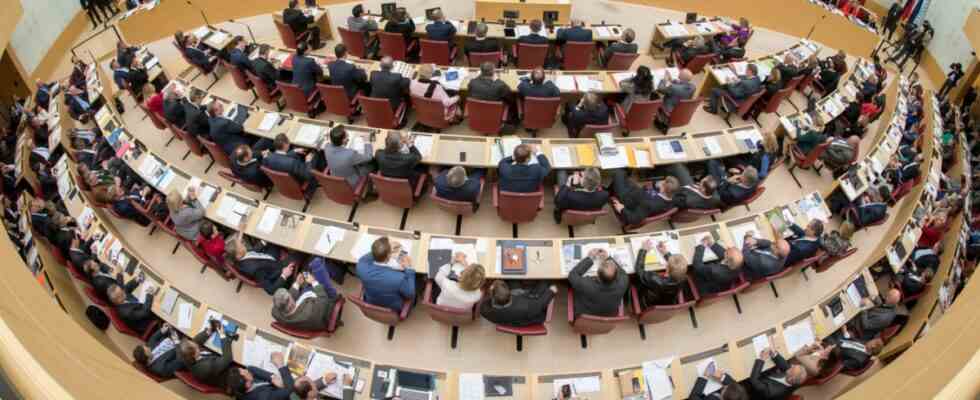She’s promoted and ended careers. Even if it sounds bureaucratic at first: drawing up a party list before a big election. In Upper Bavaria, the parties are currently preparing their tableaux for the state elections, and at least three of them will be looking forward to Munich. The SPD, Greens and FDP traditionally send most of the list candidates from the district over to the Maximilianeum with their big city strengths or – depending on your point of view – rural weaknesses.
The Greens met last weekend in Ingolstadt to draw up their Upper Bavaria list. Unsurprisingly, the two faction leaders Katharina Schulze and Ludwig Hartmann are in first and second place. Gülseren Demirel follows in fifth place and Christian Hierneis in tenth place. In the case of these four, however, the Greens now hope and expect that they will not need a place on the list because they will win their direct mandate.
The ranking of the second Munich quartet is therefore more exciting. Sanne Kurz was placed 13th, followed by the two MPs Benjamin Adjei and Florian Siekmann in 16th and 20th place. Between them is a new candidate among the candidates who is currently doing politics in the city council. Julia Post will compete in Pasing and could possibly make good use of the decent 17th position. In Pasing, the former mayor Hep Montagzeder lost to the then still incumbent mayor Josef Schmid (CSU), but was included in the state parliament because of his good result.
“It went super harmoniously, everyone was elected where they wanted to go,” said Green Party chairwoman Svenja Jarchow-Pongratz. Even if she is “mega-satisfied” with the list from a Munich point of view, she would prefer it if it were of even less importance in the future – which means that the Greens not only want to defend their direct mandates, but are also looking for more. “There are constituencies where there is still something to be gained. We are playing for a win, not for a place.” In the last state election, the Greens won five out of nine constituencies.
Florian von Brunn leads the SPD list
The SPD and FDP are currently a long way from that. After the election, the places on the lists of both parties will decide who gets into the state parliament. However, the system is much more flexible for state elections than for federal elections. Here, people can also be elected with the second vote, the total result of both votes decides on the position on the list. But of course the rule also applies: It is easier to get the second cross if you are higher up on the ballot paper.
The SPD therefore has a rough 3:1 ratio, i.e. three from the country and one from the city. The Bavarian top candidate Florian von Brunn will lead the list. State Parliament Vice President Markus Rinderspacher is in fifth place. The previous MPs Diana Stachowitz and Ruth Waldmann follow in eighth and tenth place.
If you take the results of the last election roughly as a benchmark, City Councilor Micky Wenngatz could still have a chance of working her way up from 14th place. “Everything’s fine,” says city chairman Christian Köning, commenting on the list that was drawn up last fall. He hopes that his party will still use the room for improvement until the fall and that as many as possible from the city will make it into the state parliament.
The FDP still has room for improvement so that it can safely enter the state parliament. The list will be drawn up on February 26, according to Munich city boss Michael Ruoff, it will be exciting. Who can position himself behind the top candidate Martin Hagen is open. Helmut Markwort (direct candidate in Freising) and Wolfgang Heubisch want to run again, as do Julika Sandt and Albert Duin. The two city chairmen Ruoff and Jennifer Kaiser-Steiner should also strive for the future. In addition, there is the new woman with the prominent name, who is already starting the election campaign in the center: Susanne Seehofer.
The list candidates of the CSU should have little chance of entering the state parliament
The Free Voters usually get their success in the country, the Munich association consists mainly of Minister of Education Michael Piazolo. It will probably stay that way, regardless of the list. So far, only Ulrich Henkel from Munich has sat in the Maximilianeum from the AfD, but like his party colleagues, who are not very strong in the city, he should not play a major role in the list considerations.
And the CSU? On her list, which she will draw up at the end of March, she only awards consolation prizes to those who don’t manage to move in directly – which, given the CSU’s electoral successes in the country, should probably only affect Munich. However, these list candidates will only move in via the list if an electoral miracle lifts the CSU to around 50 percent or someone leaves parliament during the course of the next state parliament period.
The last place for direct candidates was awarded to Christine Müller by the CSU in Milbertshofen. She would like to get five constituencies or even six directly. And someone from city politics is supposed to clear out a blunder: the former personnel officer Alexander Dietrich is supposed to bring back Moosach, which the CSU recently lost to the then completely unknown Green Adjei.

